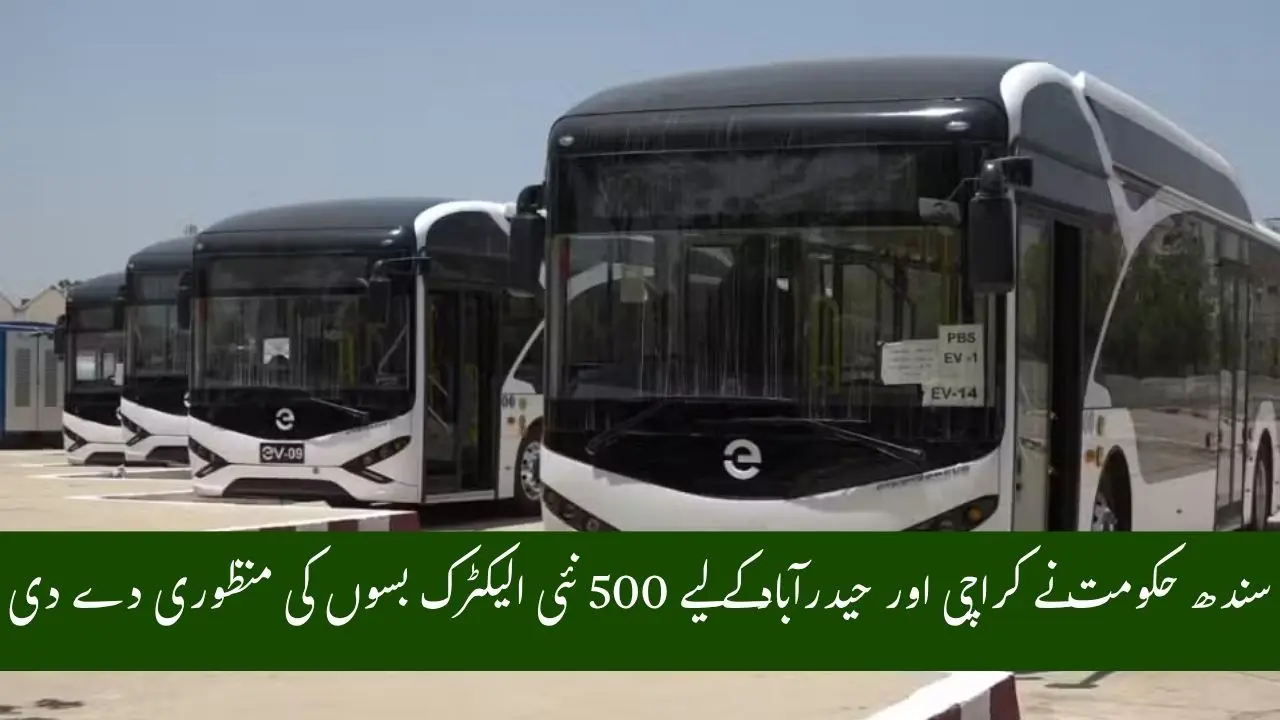Sindh Approves 500 Electric Buses for Karachi and Hyderabad – Green Transport Project 2025 Launched

The Sindh government has taken a historic leap in sustainable transport by approving 500 Electric Buses for Karachi and Hyderabad under the People’s Green Transport Project 2025. The initiative aims to transform Pakistan’s largest metropolitan areas into cleaner, modern, and energy-efficient urban hubs.
The decision was finalized in the 48th meeting of the Public-Private Partnership (PPP) Policy Board, chaired by Chief Minister Syed Murad Ali Shah at CM House. The project promises not only environmental improvement but also a significant boost to Sindh’s digital and green infrastructure.
🚍 Karachi Electric Bus Plan – Modern Fleet, Smart Infrastructure, and Digital Fare System
Under the Karachi Electric Bus Plan 2025, 500 electric buses will be introduced across key routes connecting residential, commercial, and industrial zones. Each bus will feature:
- Climate-controlled passenger cabins for comfort
- Automated Fare Collection System (AFCS) for contactless payments
- GPS-based Intelligent Transport Management System (ITMS)
- CCTV cameras and emergency alert systems for safety
- Integration with Green Line BRT and Orange Line corridors
The Transport Department confirmed that this fleet will serve 200,000 passengers daily, reducing traffic congestion and making Karachi’s mobility more efficient and affordable.
🏛️ CM Murad Ali Shah Electric Buses Vision – Building a Clean and Connected Sindh
During the PPP board meeting, Chief Minister Murad Ali Shah emphasized the urgent need for environment-friendly transport solutions.
“This project reflects our long-term vision to make Sindh’s cities sustainable, safe, and smart. With 500 new electric buses, we are addressing both pollution and public transport challenges,”
stated the Chief Minister.
He directed all departments to accelerate implementation and maintain transparency, ensuring that the Sindh Green Transport Project 2025 becomes a benchmark for future development programs.
Check Also: Good News – Punjab Govt Approves 48 New Buses for Special Education Centres 2025
⚙️ Sindh Green Transport Project 2025 – Structure, Funding, and Public-Private Partnership
The Sindh Green Transport Project is structured under a Public-Private Partnership (PPP) model, which ensures a transparent, shared-responsibility system.
Key Features of the PPP Model:
- The private partner will procure, operate, and maintain the bus fleet.
- The government will provide policy, infrastructure, and regulatory support.
- A 12-year concession period has been set, allowing private firms to recover investments.
- Revenue will come from fare collection, advertisements, and operational efficiency incentives.
This framework is designed to attract local and international investors, ensuring long-term sustainability without burdening the provincial budget.
🔋 Hyderabad Electric Buses – Expanding Clean Transport Beyond Karachi
While Karachi remains the main focus, Hyderabad Electric Buses will play a vital role in expanding Sindh’s green mobility network. In the first phase, 100 electric buses will begin operations in Hyderabad, covering routes like Latifabad, Qasimabad, and Autobahn Road.
Each bus depot will include:
- Solar-powered charging stations
- Maintenance workshops
- Passenger waiting lounges
- Smart ticketing counters
Hyderabad’s inclusion ensures that the Sindh Electric Bus Project 2025 benefits both metropolitan and secondary cities, supporting the government’s balanced regional development policy.
Check Also: CM Maryam Nawaz Launches 15 Electric Buses to Operate on Three Urban Routes in Pakpattan
💰 Economic and Employment Impact – Green Jobs and Cost Efficiency
The Green Transport Project will generate over 5,000 direct jobs for drivers, mechanics, and IT staff, plus thousands of indirect jobs in manufacturing and services.
Economic highlights:
- Lower operating costs: Electric buses cost 30–40% less to operate than diesel ones.
- Reduced oil imports: Saves millions in annual fuel expenditure.
- Local manufacturing potential: Talks are underway with Chinese and Turkish EV manufacturers to set up local assembly plants in Sindh.
- Technology transfer: Domestic industries will gain expertise in battery, charging, and EV systems.
By cutting costs and emissions simultaneously, Sindh is positioning itself as a regional leader in green transport economics.
🌱 Environmental Benefits – Fighting Air Pollution in Karachi and Hyderabad
Karachi and Hyderabad face high levels of air pollution due to diesel buses and outdated vehicles. The shift to electric buses offers multiple environmental advantages:
- 30,000 tons of CO₂ emissions reduced annually
- Improved air quality, particularly in high-traffic areas
- Reduced noise pollution and fuel dependency
- Integration of solar charging systems powered by renewable energy
Environmental experts have hailed the project as “Pakistan’s most ambitious urban climate intervention,” directly supporting UN Sustainable Development Goals (SDGs).
🚦 Smart Transport Technology – Real-Time Monitoring and Passenger Safety
The Sindh Electric Bus Project 2025 introduces world-class smart technology for public transport efficiency and safety.
Technology Features:
- Mobile App Integration: Passengers can track buses live and plan routes.
- Cashless Payments: Smart cards and QR codes for digital transactions.
- Fleet Monitoring System: Transport Department can monitor fuel savings, speed, and punctuality.
- AI-based Traffic Analytics: Data collected will help design better routes and reduce congestion.
By adopting smart mobility systems, Sindh becomes one of the first provinces in South Asia to combine electric mobility with digital transport analytics.
🧭 Project Implementation Timeline – Three Phases of Green Rollout
The 500-bus initiative will be rolled out in three strategic phases:
Phase 1 (2025–2026):
- Launch of 200 buses in Karachi and 50 in Hyderabad.
- Two charging depots built in Saddar and Latifabad.
Phase 2 (2026–2027):
- Addition of 150 buses across Karachi’s major routes.
- New charging infrastructure and digital monitoring systems.
Phase 3 (2027–2028):
- Final deployment of the remaining 100 buses.
- Integration with the Green Line BRT and Hyderabad’s inter-city corridor.
The complete rollout will serve 200,000+ commuters daily and create a seamless urban mobility network.
Check Also: Breaking News: Pakpattan Gets Its First Government Transport System in 750 Years
🧠 Sindh’s Long-Term Vision – Toward a Carbon-Neutral Transport Future
The Sindh government’s green mobility strategy extends beyond buses. The Transport Department plans to introduce:
- Electric rickshaws and taxis for short-distance commuting
- Inter-city EV routes connecting Karachi, Hyderabad, and Sukkur
- EV training centers for youth skill development
- Public charging stations on highways and at shopping centers
By 2030, Sindh aims to convert 30% of its public transport fleet to electric, making it Pakistan’s leading clean-energy province.
Check Also: Punjab Govt Inaugurates Electric Bus Network 2025 – Clean Transport for All
❓ FAQs about Sindh Approves 500 Electric Buses for Karachi and Hyderabad:
Q1. What is the Sindh Electric Bus Project 2025?
It’s a public-private partnership project to launch 500 electric buses across Karachi and Hyderabad.
Q2. How many passengers will benefit daily?
Over 200,000 people are expected to benefit once the full fleet is operational.
Q3. When will the first buses start service?
The first 200 buses are expected to hit the roads by mid-2025.
Q4. Will Hyderabad get electric buses too?
Yes, 100 buses will operate in Hyderabad under Phase 1 and 2.
Q5. What are the main benefits of this project?
Cleaner air, digital payments, lower travel costs, and modern public transport experience.







